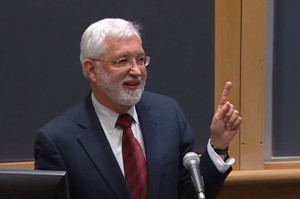Palin Judge Doesn't Know What Push Notifications Are, But Knows They're No Big Deal
This could have gone better.

Judge Jed Rakoff (screenshot via YouTube)
When jurors found in favor of the defendants in Sarah Palin’s defamation suit against the New York Times, US District Judge Jed Rakoff must have thought he stuck the landing. Having already dismissed the case in open court while the jury was deliberating, he had handily saved the parties the necessity of yet another trial if the Second Circuit overruled him again.
Ten out of ten, your honor! Except …

Curbing Client And Talent Loss With Productivity Tech
It immediately emerged that some of the jurors had received push notifications on their phones informing them that the court had dismissed the case before they rendered their verdict.
“It is the Court’s uniform practice after a verdict has been rendered in a jury trial to have the Court’s law clerk inquire of the jury as to whether there were any problems understanding the Court’s instructions of law, so that improvements can be made in future cases,” he wrote in a February 16 order, admitting that some jurors had “involuntarily received ‘push notifications’ on their smartphones that contained the bottomline of the ruling,” but that the jurors were adamant that “these notifications had not affected them in any way or played any role whatever in their deliberations.”
Almost immediately, Palin moved to set aside both Rakoff’s ruling and jury verdict, disqualify Rakoff, and interview the individual jurors.
Judge Rakoff has now responded, sort of, in a 68-page opinion laying out his reasoning for dismissing the case under Rule 50, as well as a somewhat defensive insistence that the jurors’ discovery of his ruling from the bench was no big deal.
Sponsored

Law Firm Business Development Is More Than Relationship Building

How The New Lexis+ AI App Empowers Lawyers On The Go

AI Presents Both Opportunities And Risks For Lawyers. Are You Prepared?

AI Presents Both Opportunities And Risks For Lawyers. Are You Prepared?
Noting that “the jury in this case was a model jury, carefully watching the witnesses, taking copious notes, and in general, showing that they intended to decide the case based solely on the evidence,” the court expressed “great confidence in the integrity of the verdict,” notwithstanding the fact that several of the jurors knew that their decision was in effect a nullity before it was even rendered.
In fact, counsel for the defense did raise the issue of push notifications coming to jurors’ phones. But Judge Rakoff declined to take any action, such as ordering jurors to put their phones in airplane mode during deliberation, because apparently he didn’t know what a push notification was.
The Court is frank to confess that it was not familiar with the term “push notification” when it was raised by counsel for the Times and did not fully appreciate the potential for jurors to be involuntarily informed about the Court’s intended ruling through their smartphones. But it must also be remembered that when defense counsel referred to the term “push notifications,” Tr. 1307, the Court responded by doing what defendants’ counsel requested, i.e., reminding the jurors of their duty to disregard anything they heard about the case in the media. Defendants’ counsel sought no further relief (such as a direction to the jurors to turn off any automated alerts for the duration of the trial) and plaintiff’s counsel did not seek any such step or indeed any instruction to the jury whatsoever.
As the court points out, as a legal matter, it probably makes no difference, since the jury verdict had been set aside before it was rendered. But it’s a high-profile case, and this whole push notifications thing is really not helpful.
“In a case attracting a high degree of public attention, it is inevitable that at least some jurors will encounter information outside the Court’s control, even if they are completely conscientious,” the court sniffs, conceding that, “Here, of course, it was the timing of the Court’s announcement of its Rule 50 determination that increased the risk that some jurors would encounter some snippets of the Court’s legal conclusion, and that is unfortunate.”
Sponsored

Curbing Client And Talent Loss With Productivity Tech

Happy Lawyers, Better Results The Key To Thriving In Tough Times
Nevertheless, the court assures us that all is well.
While some outsiders, totally unfamiliar with the exceptional jury in this case, have been quick to assume otherwise, the Court knows of no reason why the highly conscientious citizens who served as jurors in this case would be so firm that they were unaffected by this information unless it were true. The Court is thus left with the definite conviction that the information did not remotely affect the ultimate verdict.
Well, surely that will put this entire unfortunate business to rest then.
Palin v. The New York Times Co. [Docket via Court Listener]
Elizabeth Dye lives in Baltimore where she writes about law and politics.







